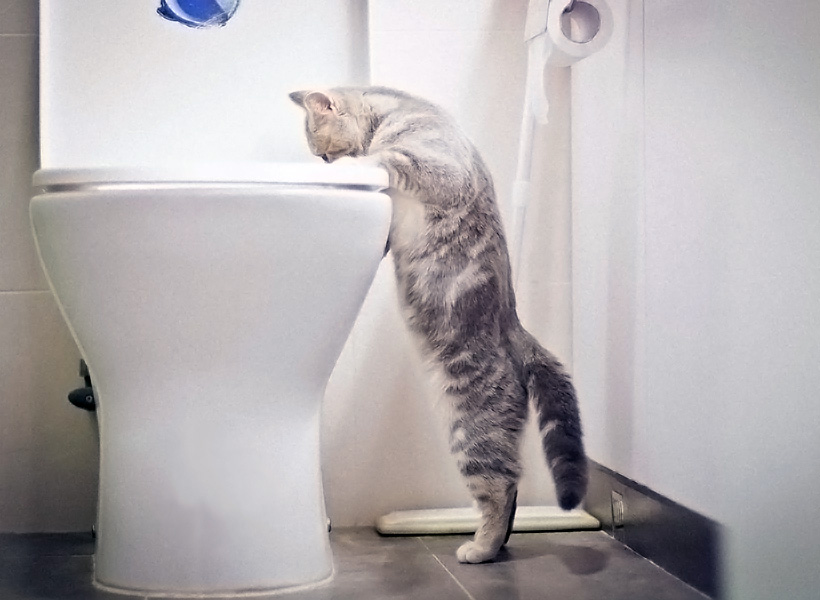We have come across the article pertaining to Can You Flush Cat Poop Down The Toilet? below on the internet and reckoned it made good sense to discuss it with you on my blog.

Introduction
As feline owners, it's necessary to be mindful of how we get rid of our feline pals' waste. While it may appear hassle-free to flush feline poop down the commode, this practice can have detrimental consequences for both the atmosphere and human health.
Environmental Impact
Purging feline poop presents unsafe pathogens and parasites into the water supply, positioning a considerable danger to water ecological communities. These impurities can adversely affect aquatic life and concession water high quality.
Health and wellness Risks
In addition to environmental issues, flushing pet cat waste can also position health risks to humans. Pet cat feces might include Toxoplasma gondii, a bloodsucker that can cause toxoplasmosis-- a potentially extreme disease, especially for pregnant women and individuals with weakened immune systems.
Alternatives to Flushing
Luckily, there are more secure and extra liable means to get rid of feline poop. Take into consideration the following options:
1. Scoop and Dispose in Trash
The most usual technique of throwing away feline poop is to scoop it right into a biodegradable bag and toss it in the garbage. Make certain to make use of a specialized trash inside story and take care of the waste immediately.
2. Use Biodegradable Litter
Opt for eco-friendly feline litter made from products such as corn or wheat. These litters are eco-friendly and can be securely gotten rid of in the trash.
3. Hide in the Yard
If you have a yard, think about burying feline waste in a marked location far from vegetable gardens and water resources. Be sure to dig deep adequate to stop contamination of groundwater.
4. Mount a Pet Waste Disposal System
Purchase a family pet garbage disposal system specifically made for pet cat waste. These systems utilize enzymes to break down the waste, lowering odor and ecological impact.
Final thought
Liable family pet possession extends past giving food and sanctuary-- it also involves correct waste management. By refraining from flushing cat poop down the toilet and choosing different disposal techniques, we can minimize our environmental impact and safeguard human wellness.
Why Can’t I Flush Cat Poop?
It Spreads a Parasite
Cats are frequently infected with a parasite called toxoplasma gondii. The parasite causes an infection called toxoplasmosis. It is usually harmless to cats. The parasite only uses cat poop as a host for its eggs. Otherwise, the cat’s immune system usually keeps the infection at low enough levels to maintain its own health. But it does not stop the develop of eggs. These eggs are tiny and surprisingly tough. They may survive for a year before they begin to grow. But that’s the problem.
Our wastewater system is not designed to deal with toxoplasmosis eggs. Instead, most eggs will flush from your toilet into sewers and wastewater management plants. After the sewage is treated for many other harmful things in it, it is typically released into local rivers, lakes, or oceans. Here, the toxoplasmosis eggs can find new hosts, including starfish, crabs, otters, and many other wildlife. For many, this is a significant risk to their health. Toxoplasmosis can also end up infecting water sources that are important for agriculture, which means our deer, pigs, and sheep can get infected too.
Is There Risk to Humans?
There can be a risk to human life from flushing cat poop down the toilet. If you do so, the parasites from your cat’s poop can end up in shellfish, game animals, or livestock. If this meat is then served raw or undercooked, the people who eat it can get sick.
In fact, according to the CDC, 40 million people in the United States are infected with toxoplasma gondii. They get it from exposure to infected seafood, or from some kind of cat poop contamination, like drinking from a stream that is contaminated or touching anything that has come into contact with cat poop. That includes just cleaning a cat litter box.
Most people who get infected with these parasites will not develop any symptoms. However, for pregnant women or for those with compromised immune systems, the parasite can cause severe health problems.
How to Handle Cat Poop
The best way to handle cat poop is actually to clean the box more often. The eggs that the parasite sheds will not become active until one to five days after the cat poops. That means that if you clean daily, you’re much less likely to come into direct contact with infectious eggs.
That said, always dispose of cat poop in the garbage and not down the toilet. Wash your hands before and after you clean the litter box, and bring the bag of poop right outside to your garbage bins.
https://trenchlesssolutionsusa.com/why-cant-i-flush-cat-poop/

I recently found that blog posting on Don’t flush cat feces down the toilet when exploring the internet. Sharing is good. You never know, you may just be doing someone a favor. Many thanks for your time. Come back soon.
Visit Homepage